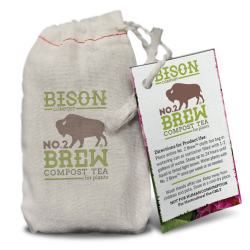Culture | March 31st, 2016

By Ben Haugmo
Spring is just around the corner, and what better way to ring it in than with a round of gardening?
To ensure the plants grow strong and healthy, it’s often recommended that one apply a form of fertilizer. Rather than taking the chemical route or waiting for leftovers to decay, why not try a unique alternative with Bison Compost?
Thomas Duenow founded Bison Compost three years ago in collaboration with North Prairie Bison Ranch outside Leeds, N.D. In the excess manure being produced by the bison, Duenow saw opportunity.
“The ranch is a feed-lot operation and the animals were producing a lot of manure,” said Duenow. “I suggested that the ranch might want to look into composting the manure, which could produce a great value-added agricultural product.”
In order to produce the compost, manure is gathered and laid out in long stretches called windrows, each 12 feet wide, seven feet tall, and about 200 feet long.
“We use a Vermeer compost turner to turn the windrow,” said Duenow. “We then begin monitoring and record the temperature of the windrows with a temperature probe. The windrows will heat up, cool down and we’ll then turn the windrow again. We continue that process until the windrow doesn’t heat anymore. We then let the compost cure for a minimum of 30 days. After curing we use a trommel screen to achieve the customer's requirement for particle size, typically about a half inch.”
Bison hunting and fur trading in North America reached its peak between 1830 and 1880, which led to a steep decline in bison populations. At the onset of the twentieth century, bison were approaching extinction, with less than 300 left alive. Thanks to strict legislation preventing the hunting of bison, however, the beasts have made a comeback, with an estimated 500,000 individuals living in the wild or in private ownership.
In the present day, people are able to coexist with the resurgent bison herds, finding more economical and fewer ecologically disastrous uses for the increased numbers. With renewed populations comes plentiful amounts of manure, ripe for use in fertilizing fields and gardens.
Bison Compost offers products for at-home and for large-scale planting. One product useful for smaller gardens is the No. 2 Brew compost tea bag. The bag can be steeped in watering cans overnight and used to feed plants the next day. Bison Compost products contain essential nutrients for plants, such as nitrogen, phosphorous, and potassium, without the need for chemical additives. When it comes to making a healthy, organic product, the bison know what they’re doing.
YOU SHOULD KNOW:
https://www.bisoncompost.com/
February 23rd 2026
February 16th 2026
February 13th 2026
January 15th 2026
January 15th 2026



_(1)_(1)_(1)_(1)_(1)__293px-wide.jpg)
_(1)__293px-wide.png)
__293px-wide.png)